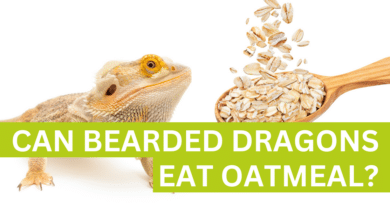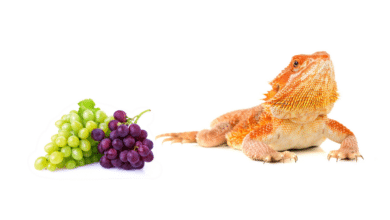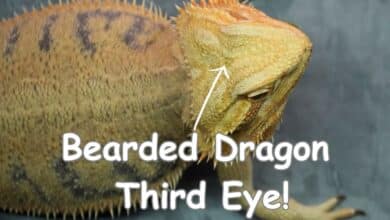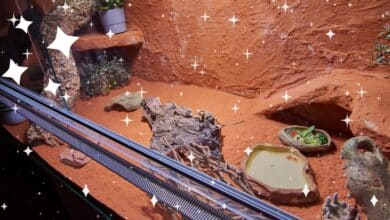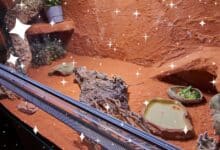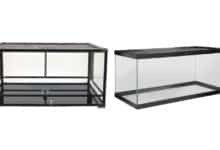Can Bearded Dragons Eat Clover? (Safe Feeding Guide)
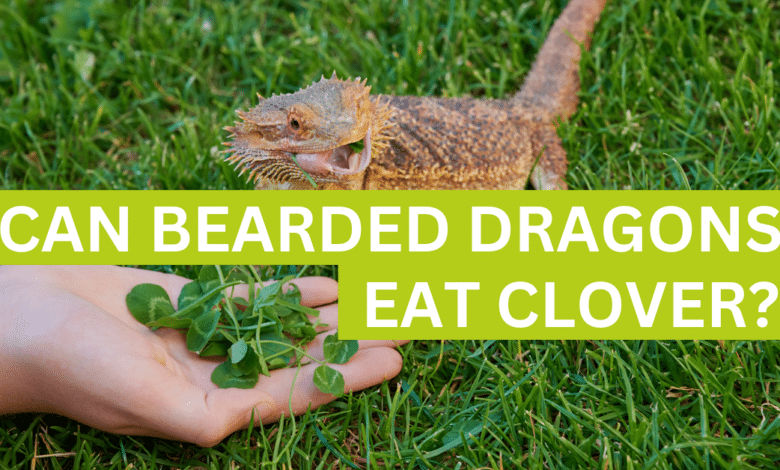
If you wonder whether bearded dragons are able to eat clover, you might be concerned about the potential health risks of this plant. Clover is not toxic to beardies; however, it is also not an ideal regular food choice for them either.
In this guide, we’ll review the potential benefits and downsides of feeding clover to your bearded dragon so you can decide whether to feed it to your beardie.
Contents
Is Clover Poisonous to Bearded Dragons?
Clover contains high levels of oxalic acid, which can bind to calcium and prevent its absorption. This can lead to metabolic bone disease (MBD), a condition that affects the bones of reptiles and can cause weakness, deformities, and even death.
In addition to its effects on calcium absorption, oxalic acid can also cause inflammation and damage to cells in the digestive tract, leading to digestive issues and other health problems in bearded dragons.
If you want to feed your bearded dragon a varied diet that includes greens, many other options are safer and more nutritious than clover. Some good choices include collard greens, mustard greens, and dandelion greens, all of which are high in calcium and other essential nutrients.
In summary, clover is not poisonous to bearded dragons, yet it is also not a recommended regular food choice for them due to its high levels of oxalic acid and potential health risks. It is important to provide your bearded dragon with a varied and balanced diet that meets its nutritional needs and supports its immune system.
Clover Nutritional Value
Clover is a common plant found in many gardens and fields. It can be a source of various nutrients for many animals, including bearded dragons. Here are some of the nutritional values of clover:
- Nutrients: Clover can be a good source of many important nutrients for bearded dragons, such as fiber, carbohydrates, and protein.
- Calcium: Clover contains a moderate amount of calcium, which is essential for bearded dragons to maintain healthy bones and teeth.
- Nitrogen: Clover is high in nitrogen, which helps promote healthy plant growth. However, too much nitrogen can harm bearded dragons, so it is important to feed them clover only in moderation.
- Vitamin A: Clover is a good source of vitamin A, which is important for bearded dragons’ eye health and immune system.
- Antioxidants: Clover contains antioxidants that can help protect bearded dragons from oxidative stress and other harmful effects of free radicals.
- Minerals: Clover contains a variety of minerals that are important for bearded dragons, including potassium, magnesium, and phosphorus.
- Blood clotting: Clover contains vitamin K, which is essential for blood clotting and can help prevent excessive bleeding.
- Iron: Clover contains iron, which is important for the production of red blood cells in bearded dragons.
- Vitamin D: Clover contains vitamin D, which helps bearded dragons absorb calcium more efficiently.
- Sodium: Clover contains low sodium, which is suitable for bearded dragons as they do not need much in their diet.
Overall, clover can be a nutritious addition to a bearded dragon’s diet. However, it should only be fed in moderation and as part of a varied diet to ensure your bearded dragon gets all the nutrients it needs to stay healthy.
Benefits of Clover to Bearded Dragons
Clover is a plant that can be beneficial to your bearded dragon’s health if fed only in moderation. Here are some reasons why:
- High Water Content: Clover has a high water content, which can help keep your bearded dragon hydrated. This is especially important during hot weather or if your bearded dragon is sick.
- Vitamins and Minerals: Clover is a good source of vitamins and minerals important for your bearded dragon’s health. It contains vitamin A, vitamin C, and folate, which can help support your bearded dragon’s immune system and prevent metabolic bone disease.
- Supplements: Clover can be a good supplement to your bearded dragon’s diet. It can be fed as a treat or mixed with other foods to provide variety and additional nutrients.
- Weight Loss: If your bearded dragon is overweight, clover can be a good addition to its diet. It is low in calories and high in fiber. These properties can help promote weight loss.
- Reproduction: Clover can also benefit bearded dragons during the breeding season. It contains nutrients that can help support reproduction and egg production.
Clover can be a healthy addition to your bearded dragon’s diet. However, it should be fed to it sparingly and should only be fed in moderation. As with any new food, introduce clover slowly and monitor your bearded dragon for any adverse reactions.
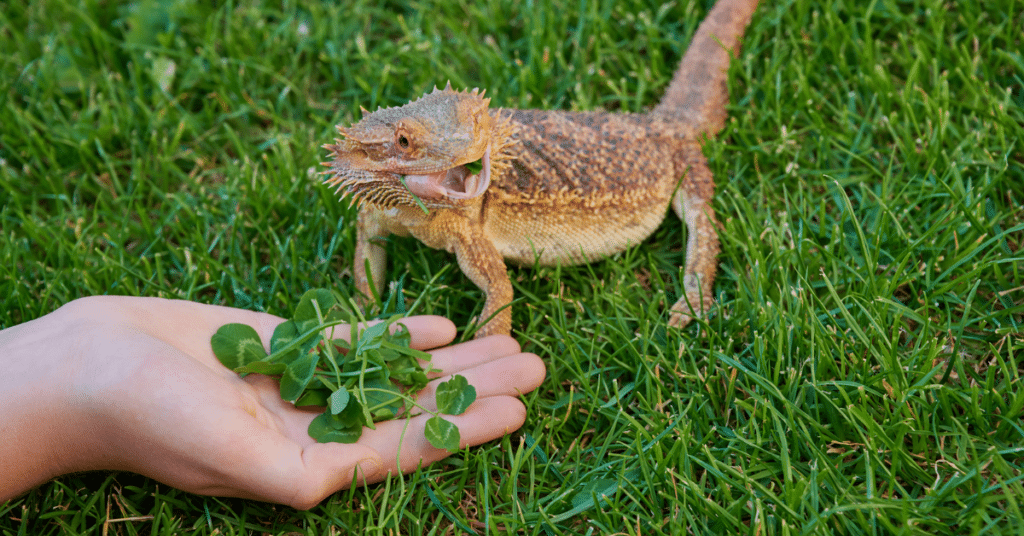
Risks of Bearded Dragons Eating Clover
Clover is a common plant that is often found in gardens and fields. While it may seem harmless, it can pose a risk to beardies if they consume it in large quantities. Here are some of the risks associated with bearded dragons eating clover:
- Nitrogen toxicity: Clover is a legume that is known for fixing nitrogen in the soil. This means it absorbs nitrogen from the air and converts it into a form that plants can use. While this is beneficial for the soil, it can be harmful to bearded dragons if they consume too much clover. Nitrogen toxicity can cause a range of symptoms, including lethargy, loss of appetite, and even death.
- Oxalate toxicity: Clover contains oxalates, compounds that can bind to calcium and other minerals in the body. This can lead to calcium deficiency, which can cause a range of health problems in bearded dragons. Symptoms of oxalate toxicity include weakness, tremors, and seizures.
- Digestive problems: Clover has high amounts of fiber. Unfortunately, bearded dragons cannot digest high amounts of fiber. The high fiber content of clover can lead to digestive problems such as bloating, diarrhea, and constipation.
To avoid these risks, you should only feed your bearded dragon clover sparingly and prevent your bearded dragon from eating too much natural clover outside.
Alternatively, there are better options to provide them with a diet high in calcium and low in fiber that is better for their health. This can include foods such as crickets, mealworms, and leafy greens.
If you suspect your bearded dragon has consumed a large amount of clover, it is important to monitor them closely for any signs of toxicity or digestive problems. If you notice any symptoms, contact your veterinarian immediately.
Preparing Clover for Feeding Bearded Dragon
If you decide to feed your bearded dragon clover, it is important to prepare it properly to ensure it is safe and nutritious. Here are some tips on how to prepare clover for feeding your bearded dragon:
- Wash the clover thoroughly to remove any dirt or debris.
- Cut the clover into small pieces to make it easier for your bearded dragon to eat.
- Feed bell peppers, celery, zucchini, collard greens, mustard greens, and apples alongside clover to add variety to your bearded dragon’s diet.
- Remember to feed your bearded dragon clover only in moderation, as it should not be a significant food source for your bearded dragon.
Keep in mind that clover has a slightly bitter taste, so your bearded dragon may not immediately like eating it.
How Much Clover Should Bearded Dragons Eat?
Clover is safe for pet bearded dragons to eat in moderation but should not make up a significant portion of their diet. While it is a good source of fiber and potassium, it is also high in phosphorus, which can negatively affect your pet’s health if they consume too much of it.
As a treat, you can offer your bearded dragon small amounts of clover once a week. This should be in addition to their regular diet of vegetables, fruits, and insects. When feeding your bearded dragon clover, it’s important to ensure it is free of pesticides or other harmful chemicals.
If you notice any signs of lethargy, swelling, or tissue damage in your bearded dragon after feeding it clover, it’s important to speak with a veterinarian. These symptoms may indicate hypervitaminosis A, which can occur when bearded dragons consume too much vitamin A.
